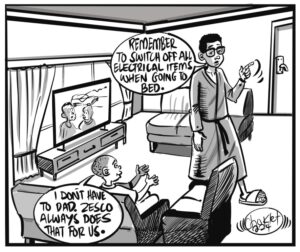Commissioner for Refugees Abdon Mawere has bemoaned the lack of adequate collaboration between his department and the Immigration Department when it comes to refugee affairs.
Maware made this complaint in an interview when he was asked to comment on lamentations from some former Rwandan refugees who are being arrested by the Immigration Department despite having documentation legalizing their stay from the Commissioner for Refugees.
One of the victims, who sought to speak anonymity, narrated that he was arrested on December 29, 2019 during an Immigration Department operation despite producing documentation from the Commissioner for Refugees which also falls under the Ministry of Home Affairs.
“They came on Sunday, 29th around 14:00 hours, our friends were arrested in different areas starting on the 28th. The immigration officers were arresting even if you have documentation, a friend of mine even had documentation stating his former refugee status but they still arrested him. On Sunday, they came with three vehicles, I didn’t even close the shop, I showed my temporal permit and they refused to acknowledge it saying ‘these papers don’t work’, they were just targeting shops and that’s how I told my workers to close the shop to avoid being beaten. So we were then taken to the Immigration Department headquarters where a certain lady insisted that we be incarcerated despite having documentation to prove our former refugee status despite complaints. After that, we were taken to Kamwala remand prison and I was released on the 31st of December after paying off one of the officers,” narrated the former refugee.
And when reached for a comment, Immigration Department public relations officer Namati Nshinka confirmed the operation but could not state how many and on what charges some refugees were arrested.
“Yes, there could be, we had an operation on Saturday and Sunday so I am sure among them were some refugees, former refugees. You know what happens, if you are a refugee you are supposed to be in the refugee settlement or refugee camp unless you have permission. Some of the people we apprehend are those who leave the camp without any authority and find themselves in urban areas and they don’t have any authority to leave the camp, they don’t have the gate pass from the camp so those could be the ones that were apprehended, I will need to confirm as to how many and for what reason,” said Nshinka.
But in a separate interview, Maware admitted that there were times former refugees were apprehended despite having documentation.
He lamented that there was lack of adequate collaboration between the two departments.
“The issue of us being under the Ministry of Home Affairs is very important, that’s crucial and we both are working towards the same purpose which is to maintain internal security and that’s our job both of us, department of immigration and the department of refugees, that’s our job. The only thing that I think differs is that we are facilitating the stay of people that run away from their countries of origin. So the only difference is that for the department of refugees, the job is to keep people here that run away from their countries due to persecution, due to violence while the immigration, their job, as much as I know is to manage migration, how people stay in the country. So there is no conflict at all. The only thing is that I think when we are operating, we operate separate and perhaps that’s what our honorable minister has been emphasizing that we need to coordinate more so that we take care of people that are here legally and those that are not here legally,” he said.
“And maintaining internal security doesn’t mean we should be arresting everyone or anyone, maintaining internal security means monitoring the people that may cause a danger to our security and for us, we think that when we identify them, it means that they are identifiable and it means that they are not a risk to our security. Therefore, we have to facilitate their stay here. So it’s really something that sometimes saddens us because eventually, we have to liaise with the same immigration [department] and our colleagues from correctional service to release them because basically, they would not have committed any offense because they are not here illegally. I think I share this with the minister because he has, I think, several times advised us that we should be able to speak to each other and treat people while respecting their rights while we try to maintain internal security.”
He wondered why the former refugees were being arrested even after being given documents that allowed them to work and run businesses.
“When we give them those documents, we believe that any security officer or any responsible officer under the refugees act is supposed to take into account the fact that there is this problem with the issuance of documentation and temporarily, we have to issue them with some documents that at least will identify them as former refugees and we expect that if they are working or they are doing some piece work or running a business, we expect that our colleagues in the other security wings to facilitate that unless they have committed other offences which are not related to illegal stay because as far as we know, as a country, the Rwandans are not here illegally, we admitted them and as such we have the responsibility as a government to protect them and give them all the assistance. In fact, we encourage under our new policy of inclusiveness that they should be able to look after themselves. They should be able to engage in business, engage in employment so that they do not become a burden on the state. So that’s the stand that we have and I think this is the understanding that we all must have,” said Mawere.
“But on the question of former Rwandan refugees, indeed most of them, the majority stay in Maheba refugee settlement that’s where they are but after the secession of their refugee status, the government has a program to give them documentation which is permanent residence permit so that they can transition from being without any formal legal residence in Zambia to having some paper that is going to even transition them to citizenship. But this process has stalled because of several factors, one of them is that the former refugees are not willing to take a passport which is a requirement under the deportation and immigration act for one to get a permit. So that has sort of delayed the process over a period of time and I think this is almost the fifth year and the government has been trying to figure it out and in 2018, the President directed that we give them three year permits which are temporary. And under that permit, the refugees had the right to stay where they wish to stay and not necessarily in the settlement and we only offered I think 1,500 of them so leaving quite a large number of about 3,000 without documentation yet.”












